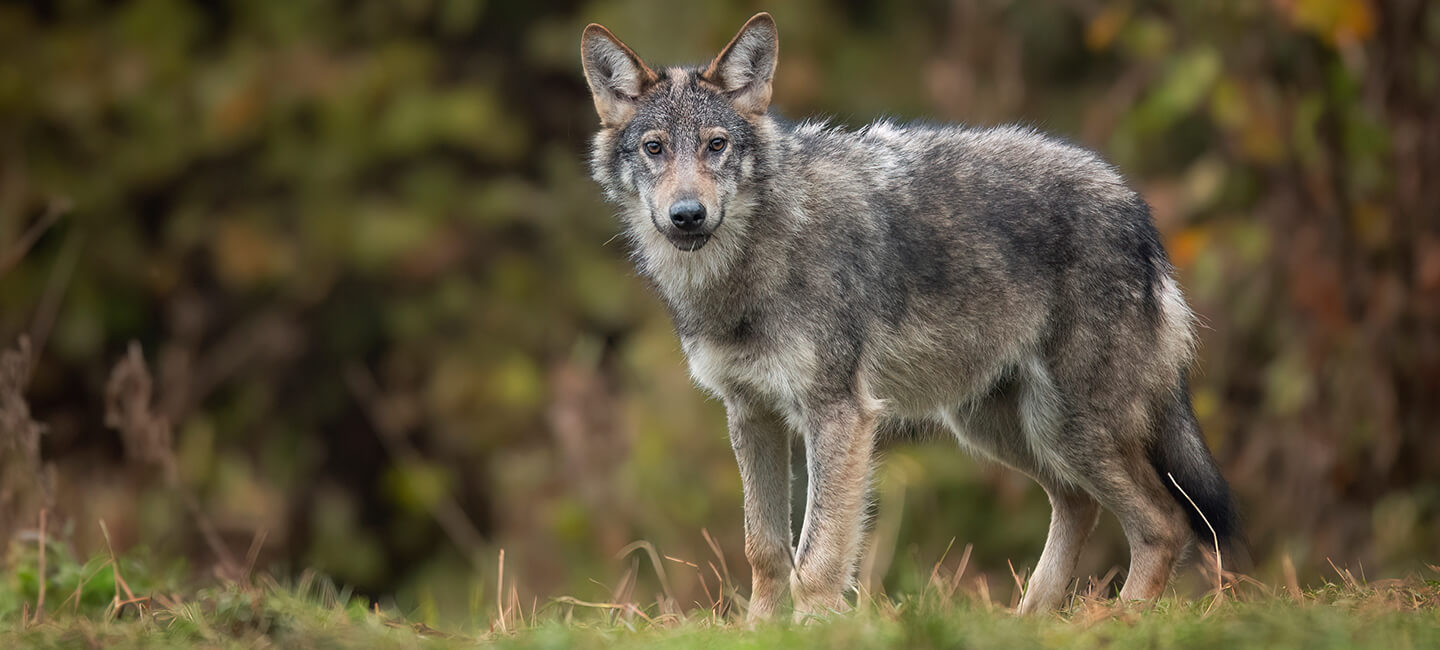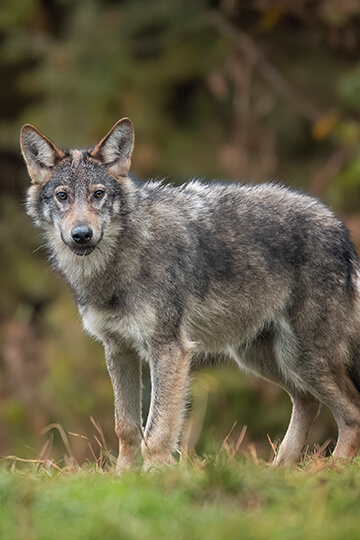

Strict wolf protection: 300 European NGOs co-sign a joint declaration
With the EU due to hold a decisive meeting in the near future to discuss the proposal to lower the level of protection for wolves, over 300 European organizations, including One Voice, are voicing their opposition to this retrograde project, in a joint statement published on September 19 at the initiative of the European Environmental Bureau (EEB).
Don’t reverse conservation progress: EU must step up coexistence efforts and maintain strong wolf protection!
The undersigned civil society and animal welfare organisations call on EU Member States to reject the European Commission’s proposal to weaken the protection status of wolves under the Bern Convention. We urge you to instead intensify efforts to achieve coexistence with large carnivores, such as wolves and bears.
The wolf is a strictly protected species and must remain so according to scientific evidence. Once nearly extinct due to persecution, hunting and habitat destruction, wolves have made a remarkable comeback to Europe’s landscapes, due to the legal protection granted by international and EU law, as well as the efforts of competent environmental authorities, farmers, scientists, NGOs, and local communities. However, their populations are still far from being in a good and viable conservation status (1). The latest IUCN assessment shows that six out of nine transboundary wolf populations in the EU are vulnerable or nearthreatened. Lowering their protection now would put the species at greater risk and undermine the EU’s legal requirement to achieve viable and stable wolf populations.
At present, there is no scientific basis to support an EU-wide modification of the existing legislation. The wolf’s recovery is still ongoing, and the main objectives of both the Bern Convention and the Habitats Directive (i.e. to ensure the restoration and conservation of endangered species) have not yet been reached. Additionally, and as confirmed in the Commission’s in-depth analysis, there is no scientific evidence that culling effectively reduces depredation on farmed animals. The objective of the Commission proposal is to reduce such wolf depredation, but there is no scientific evidence on the effectiveness of culling to achieve this. In fact, it could even be counterproductive, and increase attacks on farmed animals since it risks disrupting the wolves’ social structure.
The Commission’s proposal comes at a time of ongoing efforts to achieve coexistence between local communities and wolf populations. Over the past decade, the EU and its Member States have invested significant time and resources to enhance coexistence. This is facilitated by several EU and regional platforms, and successful LIFE-funded projects showcasing mutually beneficial solutions in the short and longer term. The proposition to reduce wolf protection undermines all those efforts and investments. It would be a shift away from the EU’s goal of achieving harmonious coexistence between humans and large carnivores.
We acknowledge the challenges that arise from the return of the wolf in some EU regions, and the impact it can have on individual farmers and animal owners. Therefore, stepping up efforts to make existing prevention measures, such as fencing, guarding dogs and reinforcing human presence, more accessible for animal owners and supporting them with the appropriate prevention tools is essential. Efforts should be maintained to adapt existing solutions to their needs. Moving away from a coexistence approach towards lowering of the protection of the wolf would ignore all the farmers who have invested in and are successfully protecting their herds from wolves for years.
It is essential to recognise that safeguarding wolves in Europe goes beyond protecting a single species; it involves preserving biodiversity and fostering a balanced living together with nature. Wolves play a vital role in ecosystem stability. Their return to regions from which they had once been eradicated marks a significant conservation achievement. In the current global biodiversity crisis, we cannot risk compromising this progress.
Recent surveys indicate strong public support across Member States for maintaining stringent protections and promoting coexistence with wolves, even among rural communities most affected by the presence of large carnivores. Wolves are an integral part of our shared European heritage and landscapes.
Rather than diminishing wolf protection, the EU should instead:
- Maintain and enhance efforts to promote coexistence between wolves and local communities, emphasising prevention measures to reduce depredation on farmed animals and improving compensation schemes. Many Member States should make better use of existing information on co-existence measures, good practice examples and available EU funding opportunities.
- Ensure proper enforcement of the existing legal protection provided by the EU Habitats Directive across all Member States and eliminate illegal hunting of wolves. Member States must deter environmental crimes, not legalise them, as confirmed in a recent case of the Court of Justice of the European Union (2).
- Support initiatives to raise citizen awareness and provide accurate, science-based information about wolves to the public, including on the ecosystem and socioeconomic benefits provided by large carnivores, and the appropriate behaviour in case of an encounter. EU citizens have the right to be well-informed.
- Respect the due scientific process enshrined in EU nature conservation legislation. According to Article 17 of the Habitats Directive, Member States will submit their conservation status assessment in 2025. Any discussion on the protection status must be based on those reports, and not be based on political pressure.
Downgrading legal protections for the wolf would not only hamper conservation efforts, but also go against strong public support and scientific evidence favouring wolf conservation in Europe. Furthermore, the politically motivated proposal of the European Commission severely risks creating a precedent for other species and opening the door to other changes in EU Nature Laws. This would lead to legal uncertainty and set back years of effective conservation efforts across the continent. Such a move would seriously tarnish the EU’s reputation as a leader in environmental protection.
- Wolf populations in the EU are in unfavourable or inadequate conservation status in six out of seven biogeographical regions according to the most recent assessments done under Article 17 of the Habitats Directive.
- Judgment of 11 July 2024, WWF Österreich and Others, Case C-601/22, ECLI:EU:C:2024:595.